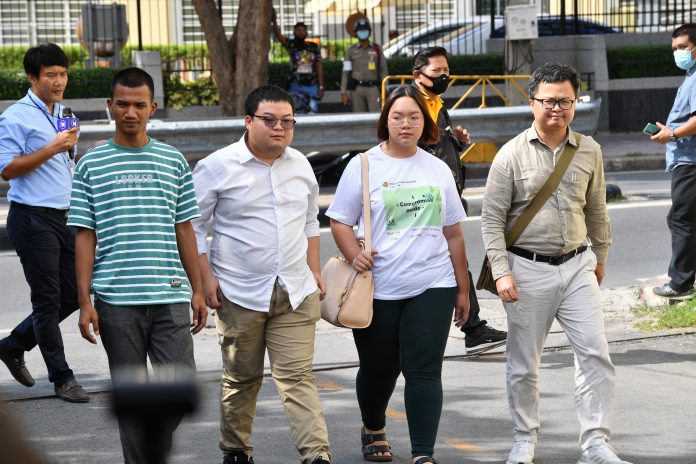A top Thai court ruled Wednesday that speeches by three protest leaders calling for royal reforms amounted to a bid to overthrow the country’s monarchy, potentially opening the way to treason charges against them.
Thailand’s royal family wields enormous influence in society and is shielded from criticism and scrutiny by royal defamation laws that carry prison sentences of up to 15 years per charge.
During major street demonstrations in August last year Panusaya Sithijirawattanakul, widely known by the nickname “Rung,” read out a list of 10 demands including more transparency of royal finances and the abolition of lese-majeste laws.
The controversial speech and others by two other protest leaders — lawyer Anon Numpa and Panupong “Mike” Jadnok — at the Thammasat University rally tested the boundaries of free speech in Thailand.
On Wednesday, the Thai Constitutional Court ruled that the speeches “aim to overthrow the constitutional monarchy.”
“If we allow the first, second and third defendant and their networks to keep doing this action, it will not be long to lead to the overthrow of the constitutional monarchy,” judge Chiranit Havanond said.
The court said the speeches were an “abuse of the rights and freedoms and harmed the state’s security.”
Judge Wiroon Sangtian said that amending the royal defamation law “will bring the monarchy to an unrespected status and could bring disobedience among the people.”
Sunai Phasuk, senior researcher with Human Rights Watch, said the ruling effectively bans any campaigning on reforming the monarchy.
“Any action demanding monarchy reform is illegal… and that means people will be prosecuted,” he told AFP.
“Another worry is that it opens the door for more serious charges including treason which carries the death penalty.”
Chulalongkorn University political scientist Thitinan Pongsudhirak said the ruling was not surprising.
“The monarchy is sacrosanct and untouchable,” he told AFP. “The consequence is that this is going to heat up the political environment.”
Thailand has been a constitutional monarchy since the end of absolute royal rule in 1932, but democracy has been punctuated by regular military coups, most recently in 2014.
The continuing influence wielded by the palace and the military was a major target for the student-led protests that gripped Bangkok late last year.
Tens of thousands thronged the streets at the height of the demonstrations but now scores of protesters and their leaders are facing multiple criminal charges including royal defamation.









